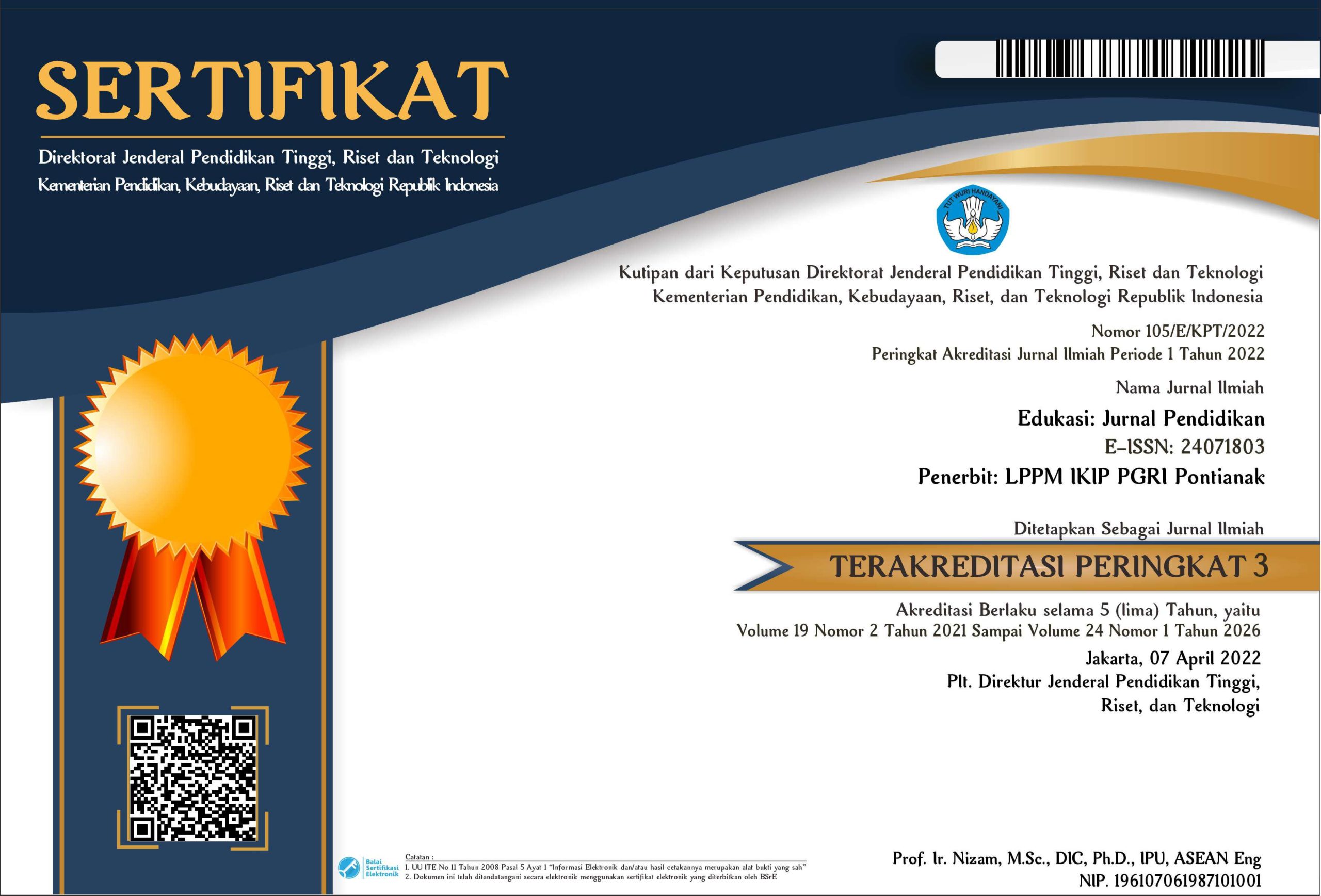Motivasi dan Kompetensi Mengajar Dosen terhadap Hasil Belajar Mahasiswa
DOI:
https://doi.org/10.31571/edukasi.v20i1.3581Keywords:
motivasi mengajar, kompetensi mengajar, hasil belajar, teaching motivation, teaching competence, learning outcomesAbstract
Abstrak
Tujuan penelitian untuk mengetahui pengaruh motivasi dan kompetensi mengajar dosen terhadap hasil belajar mahasiswa. Jenis penelitian yang digunakan adalah ex post facto. Subjek penelitian adalah mahasiswa Pendidikan Teknik Otomotif Fakultas Teknik Universitas Negeri Padang yang mengambil mata kuliah Motor Bensin. Populasi penelitian berjumlah 93 orang. Sampel penelitian berjumlah 76 orang yang dipilih menggunakan teknik proportional sampling. Alat pengumpulan data menggunakan angket. Teknik analisis data yang digunakan adalah uji regresi. Hasil penelitian menunjukkan bahwa motivasi dan kompetensi mengajar dosen secara bersama-sama tidak berpengaruh signifikan terhadap hasil belajar mahasiswa.
Â
Abstract
The purpose of the research was to determine the effect of motivation and teaching competence of lecturers on student learning outcomes. The type of research used ex post facto. The research subjects were students of Automotive Engineering Education, Faculty of Engineering, State University of Padang who took the Gasoline Motor course. The research population amounted to 93 people. The research sample amounted to 76 people who were selected using proportional sampling technique. The data collection tool used a questionnaire. The data analysis technique used regression test. The results showed that the motivation and teaching competence of lecturers had no significant effect on student learning outcomes.
Downloads
References
Abbasi, A. S., & Mir, G. M. (2012). Impact of Teacher’s Ability, Student’s Work Ethics and Institutional Environment on Student Performance of University of Gujrat. Middle-East Journal of Scientific Research, 12(4), 572-579. https://doi.org/10.5829/idosi.mejsr.2012.12.4.1716.
Arpan, M., & Marpanaji, E. (2015). Faktor-Faktor Eksternal yang Memengaruhi Hasil Belajar Pemrograman Komputer Mahasiswa PTIK STKIP PGRI Pontianak. Jurnal Pendidikan Vokasi, 5(2), 195-208. https://doi.org/10.21831/jpv.v5i2.6392.
Delar, D. A., Reinita, R., Arwin, A., & Mansurdin, M. (2022). Analisis Kemampuan Kognitif, Afektif, dan Psikomotor Peserta Didik pada Pembelajaran Tematik Terpadu Melalui Model Cooperative Tipe Make a Match di SDN 05 Sawahan Padang. Jurnal Pendidikan Tambusai, 6(1), 8390-8400.
Djamarah, S. B., & Zain, B. (2013). Strategi Belajar Mengajar. Jakarta: PT. Rineka Cipta.
Ganyaupfu, E. M. (2013). Factors Influencing Academic Achievement in Quantitative Courses among Business Students of Private Higher Education Institutions. Journal of Education and Practice, 4(15), 57-66.
Huang, B., & Hew, K. F. (2016). Measuring Learners’ Motivation Level in Massive Open Online Courses. International Journal of Information and Education Technology, 6(10), 759-764. https://doi.org/10.7763/IJIET.2016.V6.788.
Khairani, M. (2014). Psikologi Belajar. Yogyakarta: Aswaja.
Lee, J., & Martin, L. (2017). Investigating Students’ Perceptions of Motivating Factors of Online Class Discussions. International Review of Research in Open and Distributed Learning. Int. Rev. Res. Open Distrib. Learn., 18(5), 148-172. https://doi.org/10.19173/irrodl.v18i5.2883.
Lesmana, C., & Arpan, M. (2017). Penerapan Model Pembelajaran Project Based Learning terhadap Kemampuan Psikomotor, Aktivitas Belajar, dan Respon Mahasiswa. Jurnal Pendidikan Informatika dan Sains, 6(1), 8-19. http://dx.doi.org/10.31571/saintek.v6i1.483.
Lubis, A. (2018). Pengaruh Kepemimpinan, Motivasi dan Lingkungan Kerja terhadap Kinerja Mengajar Dosen di STAIM. Jurnal Education and Development, 5(2), 7-14. https://doi.org/10.37081/ed.v5i2.386.
Mamahit, C. E. J. (2019). Analisis Pengaruh Manajemen Waktu dan Motivasi Mengajar terhadap Kinerja Dosen. Jurnal Manajerial, 18(1), 1-12. https://doi.org/10.17509/manajerial.v18i1.11002.
Munandar, U. (2014). Pengembangan Kreativitas Anak Berbakat. Jakarta: Rineka Cipta.
Mustofa, B. (2015). Psikologi Pendidikan: Pendekatan, Orientasi, dan Perspektif Baru sebagai Landasan Pengembangan Strategi dan Proses Pembelajaran (Teori dan Praktik). Yogyakarta: Parama Ilmu.
Nanda, I., & Simatupang, W. (2020). Pengaruh Motivasi Mengajar Dosen terhadap Hasil Belajar Mahasiswa pada Matakuliah Listrik dan Elektronika Otomotif. Paedagoria: Jurnal Kajian, Penelitian dan Pengembangan Kependidikan, 11(1), 20-27. https://doi.org/10.31764/paedagoria.v11i1.1828.
Nurtanto, M., & Sofyan, H. (2015). Implementasi Problem-Based Learning untuk Meningkatkan Hasil Belajar Kognitif, Psikomotor, dan Afektif Siswa di SMK. Jurnal Pendidikan Vokasi, 5(3), 352-364. https://doi.org/10.21831/jpv.v5i3.6489.
Pertiwi, E., Komariah, A., & Kurniady, D. A. (2019). Pengaruh Motivasi dan Iklim Kerja terhadap Kualitas Mengajar Dosen. Jurnal Administrasi Pendidikan, 26(2), 1-11. https://doi.org/10.17509/jap.v26i2.20928.
Rahmawati, R., Siswandari, S., & Ivada, E. (2013). Faktor-Faktor yang Memengaruhi Prestasi Belajar Siswa Boarding School MAN 1 Surakarta. Jupe-Jurnal Pendidikan Ekonomi, 1(2), 1-10.
Sii, P., Verawardina, U., Arpan, M., & Sulistiyarini, D. (2017). Penerapan Model Pembelajaran Inkuiri pada Mata Pelajaran KKPI terhadap Kemampuan Psikomotorik Siswa. Jurnal Pendidikan Informatika dan Sains, 6(2), 166-176. http://dx.doi.org/10.31571/saintek.v6i2.642.
Simamora, B. (2014). Pengaruh Disiplin dan Kompetensi Dosen terhadap Prestasi Mahasiswa Program Studi Penerbitan. Jurnal Publipreneur, 2(2), 98-113. https://doi.org/10.46961/jip.v2i2.127.
Sudijono, A. (2012). Pengantar evaluasi pendidikan. Jakarta: PT. Raja Grafindo Persada.
Sufianti, A., & Permana, J. (2015). Pengaruh Motivasi Kerja dan Kompetensi Profesional terhadap Kinerja Dosen di Sekolah Tinggi Pariwisata Bandung. Jurnal Administrasi Pendidikan, 22(1), 14-25. https://doi.org/10.17509/jap.v22i1.5916.
Suprayekti & Anggraeni, S. D. (2017) Pembinaan Dosen dan Anak Usia Dini dan Pendidikan Masyarakat. Jakarta Universitas Negeri Jakarta.
Wagiran. (2013). Kinerja Guru (Teori, Penilaian dan Upaya Peningkatannya). Yogyakarta: Deepublish.
Downloads
Published
How to Cite
Issue
Section
License
Authors who publish in this journal agree to the following terms:
- Authors retain copyright and grant the journal the right of first publication with the work simultaneously licensed under a Creative Commons Attribution License (CC-BY-NC) that allows others to share the work with an acknowledgment of the work's authorship and initial publication in this journal.
- Authors are able to enter into separate, additional contractual arrangements for the non-exclusive distribution of the journal's published version of the work (e.g., post it to an institutional repository or publish it in a book), with an acknowledgment of its initial publication in this journal.
- Authors are permitted and encouraged to post their work online (e.g., in institutional repositories or on their website) prior to and during the submission process, as it can lead to productive exchanges, as well as earlier and greater citation of published work.

 Download: 181
Download: 181


















